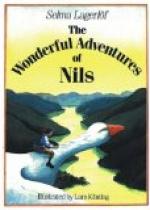But while the first bar of iron was being pressed, a second was taken from the furnace and placed under the rollers, and when this was a little along, a third was brought. Continuously fresh threads came crawling over the floor, like hissing snakes. The boy was dazzled by the iron. But he found it more splendid to watch the workmen who, dexterously and delicately, seized the glowing snakes with their tongs and forced them under the rollers. It seemed like play for them to handle the hissing iron.
“I call that real man’s work!” the boy remarked to himself.
The bear then let the boy have a peep at the furnace and the forge, and he became more and more astonished as he saw how the blacksmiths handled iron and fire.
“Those men have no fear of heat and flames,” he thought. The workmen were sooty and grimy. He fancied they were some sort of firefolk—that was why they could bend and mould the iron as they wished. He could not believe that they were just ordinary men, since they had such power!
“They keep this up day after day, night after night,” said Father Bear, as he dropped wearily down on the ground. “You can understand that one gets rather tired of that kind of thing. I’m mighty glad that at last I can put an end to it!”
“Indeed!” said the boy. “How will you go about it?”
“Oh, I thought that you were going to set fire to the buildings!” said Father Bear. “That would put an end to all this work, and I could remain in my old home.”
The boy was all of a shiver.
So it was for this that Father Bear had brought him here!
“If you will set fire to the noise-works, I’ll promise to spare your life,” said Father Bear. “But if you don’t do it, I’ll make short work of you!” The huge workshops were built of brick, and the boy was thinking to himself that Father Bear could command as much as he liked, it was impossible to obey him. Presently he saw that it might not be impossible after all. Just beyond them lay a pile of chips and shavings to which he could easily set fire, and beside it was a wood pile that almost reached the coal shed. The coal shed extended over to the workshops, and if that once caught fire, the flames would soon fly over to the roof of the iron foundry. Everything combustible would burn, the walls would fall from the heat, and the machinery would be destroyed. “Will you or won’t you?” demanded Father Bear. The boy knew that he ought to answer promptly that he would not, but he also knew that then the bear’s paws would squeeze him to death; therefore he replied:
“I shall have to think it over.”
“Very well, do so,” assented Father Bear. “Let me say to you that iron is the thing that has given men the advantage over us bears, which is another reason for my wishing to put an end to the work here.”




